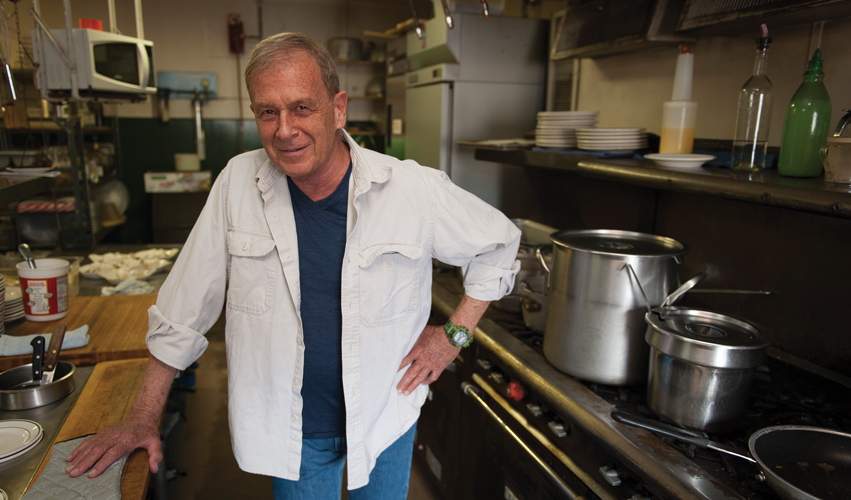
Photography by David Vernon
Bruce Brown is full of stories. He’s a passionate, hard-working man with a heart of gold—and a hearty laugh that can be heard for miles. His lifelong passions for history and photography are written on the walls of Paparazzi—the restaurant he runs in Peoria Heights with his wife and longtime partner, Lisa Mancuso. For 35 years, he’s “pursued perfection” in the kitchen, while she does the books and ensures operations run smoothly. With a loyal clientele that never fails to come back for more, the couple has managed not only to survive in an extraordinarily tough business, they’ve thrived.
A Peorian to his core, Brown attended Woodruff High School and Bradley University, where he majored in political science and history while working a string of jobs around town. But in the fall of 1969, his university days were abruptly cut short when he received his draft notice from Uncle Sam. He soon became a Marine Corps photographer, bound for Vietnam—but fate intervened on the flight overseas when the Third Marine Division pulled out of the war-torn country. Instead, Corporal Brown was stationed on the island of Okinawa, his impactful photographs documenting the experiences of his fellow Marines.
Shortly after returning from the war, he won a seat on the Peoria City Council, becoming one of the youngest Council members in the city’s history. He served two four-year terms before making a run for Peoria mayor in 1981—the same year he met the love of his life. In the summer of 1983, he and Lisa opened Paparazzi, and it’s been a local institution ever since. Over the years, the couple has given back to their community by hosting fundraising dinners at the restaurant for a multitude of good causes.
In addition, Brown maintains close ties with his beloved Marines Corps, supporting a range of veterans’ causes and serving as emcee for Memorial Day and Veterans Day ceremonies at Springdale Cemetery for many years. He’s been involved in numerous historic preservation efforts—from the recent renovation of a Depression-era steel house to the discovery and restoration of an old Civil War monument known as “The Shaft”—and to this day, he’s rarely without his camera. Brown has one daughter, Aryn Kyle, an accomplished writer who lives in New York City.
So tell me, how have you and Lisa managed to make the restaurant work all these years?
Bruce: We have a saying here: I do the hard work—which is in the back, especially in the summertime; Lisa does most of the work. She cleans the dining room, does the books and half the prep work. It's a great complementary relationship. People often ask… for 35 years, how did you do it? I'll tell you. We have a board of directors: it’s Bruce and Lisa. Sometimes we have spirited debates, but every vote has been unanimous. This is fundamentally necessary, not only in a relationship, but in a business—especially a high-stress business.
How did you get the idea to open a restaurant in the first place? Bruce, you didn't have any experience…
Lisa: And no job! His brother Peter [Brown] was a trained chef, and Bruce had mentioned to him, you know, I don’t know what I’m going to do…
Bruce: This is 1980, ‘81. I said, if I'm going to stay in construction, I have to move to Texas. If I stay in Peoria, I’m going to have to do something else.
Lisa: The economy had tanked.
Bruce: And Peter said, you should have an Italian restaurant—I'll show you what to do. And so…
Lisa: Why not? (Laughs)
Paparazzi is not the easiest place to find. How did you decide on this location?
Bruce: We looked at a number of places. I came by and saw it was for sale.
Lisa: It was the Peoria Color Lab. Back in the day, wherever you took your film in… they would send it here for processing. Bruce: Oddly enough, when I was a Bradley student I worked at Midwest Photo, and I’d come here a couple times a week to deliver film. So, I called Jefferson Bank—they wanted $110,000 and I didn’t have it. A year goes by… I was working [construction] for P.J. Hoerr and came by here again. The bank said nobody’s looked at it since me, so I made them an offer. They called back the next day: “Come pick up the key.”
Lisa: We cleared it ourselves. It was a pit! The ceiling leaked, and the chemicals from all the developing… By the time we were done, it had eaten the rubber off the bottom of my tennis shoes, just walking in all this corrosive residue. Bruce's brother-in-law also helped us.
Bruce: This place would not be here without Alex Small! But I didn't have the money to pay him. They say when you open a place like this, you should have six months of revenue in the bank. I'm not overstating this: if there was not a good first week here, there would not have been a second week.
Lisa: So Peter put together a plan, and he was our chef for the first six months.
Bruce: Then we hired a chef, but he left after about a year. I immediately called [Peter] and said, “I need some help here!” He said, “You’ve been walking around, observing, for close to a year. Why don't you take over as chef?” Two weeks later, I called him back and said, “Thank you for my life.” In two weeks, I knew this was for me. I just get in the zone and produce the goods—pursuit of perfection. Even on a busy night, I know Lisa's got it under control [in the dining room]. And to come out afterwards, making the rounds, and hear firsthand, “Oh, Bruce another fantastic [meal]…”
Lisa: One of the jokes around here is that I have the shepherd's hook. Every once in a while I pull him back and say, “Time to get to work—let these poor people finish their dinners!”
Bruce: It's a great business. Some people are born to it; some grow into it, which maybe is my case. But it’s not for everybody.
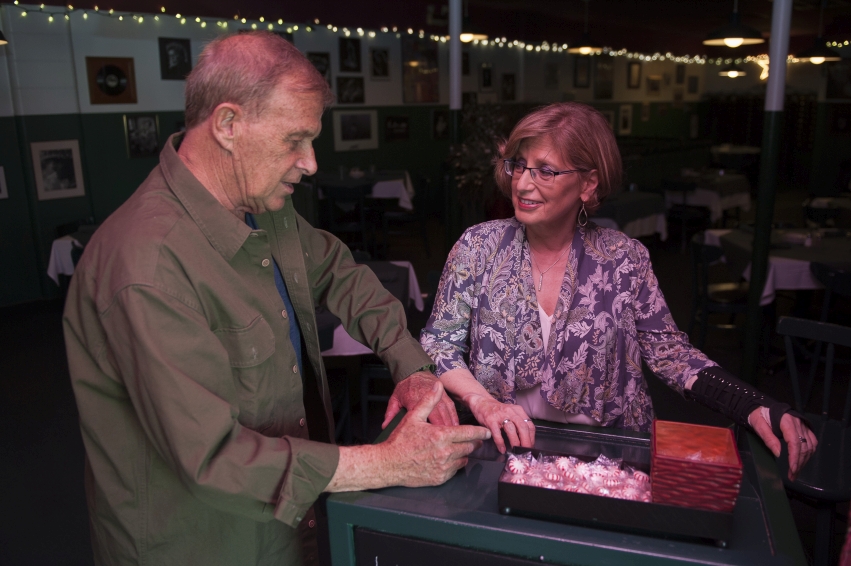
When did you feel comfortable the business was going to last?
Bruce: Last Saturday night! (laughs)
Lisa: I would say within four or five years. We were very lucky. It wasn't too long before we were doing well.
Bruce: Jerry Klein [the late Journal Star columnist] wrote a review after we were open about a year, and it was a game-changer.
Lisa: In fairness, we were the only game in town. There really wasn't a true Italian fine dining restaurant [in Peoria] back then.
Bruce: There was also not GPS, and this place was like a speakeasy! If you’re going to come here, somebody better bring you. Because of the location, people came in with diminished expectations. Once they sat down, everything changed.
Tell us about the photographs on the walls... Are they all Bruce’s?
Lisa: Bruce was friends with Alan Harkrader, a photographer from the Journal Star. We’d not been open that long, and Al was like, “Would you like some photographs?”
Bruce: [They] were tossing stuff out, and it was breaking his heart.
Lisa: All the black-and-white celebrities are Alan’s, and they didn't come all at once. Every once in a while he’d come in and say, “I just found a Harry Truman… Do you have that one?” And he’d walk around to see if he’d given it to us.
Bruce: George Burns was speaking at Knox College… and Alan took a picture of him lighting his cigar. It’s illuminated by the match—an incredible technological achievement. Some nights, customers walk around like this is a photo gallery. And some of them are mine, but invariably they’re Harkrader’s.
Paparazzi is also known for not changing much over the years...
Lisa: You get to the point where you can't change. If we decided to take chicken parchment off the menu, people would be yelling!
Bruce: Lisa is not allowed to tell me who's out here until after I've sent the dish out. Everybody gets 100 percent from me. Having said that, there are some orders, when they’re put up… I can tell you who’s out here.
Lisa: They order the same thing every time.
Bruce: Because they liked it the last time! It's consistency—getting it right and being consistent. This is the key part of Italian cooking: it’s simple stuff. Extremely good ingredients, simply prepared. It’s got to be good every time: summer, winter, spring and fall. We don't compromise. And we back that up by having a sensational crew. We have no employees; we have coworkers. It's all for one, one for all.
[At this point, Lisa leaves to run errands while Bruce continues the conversation.]
Bruce, let's circle back to the beginning. Were you born in Peoria?
Yes, February 19, 1948. I was the seventh of seven—five boys and two girls. My mother was one of the Dentino girls—her sisters had the Dentino School of Dance on the south side for many years. My father was a truck driver from Cabool, Missouri, a little town in the Ozarks. He brought coal from there to Caterpillar Tractor Company. They moved here during World War II.
What were your hobbies as a kid?
I was [into reading] books and magazines, and I was on the debate team at Woodruff. When we moved to the West Bluff, I was in the Boy Scouts and got a merit badge in astronomy. The astronomy section of the Peoria Academy of Science had Northmoor Observatory… and they showed me how to operate the telescope. I was a sophomore in high school: “Bruce Brown, here’s a key to the observatory—you can come out here anytime you want." Because some older people took an interest in some younger people.
About 10 years ago, Northmoor Observatory needed a new dome, so we had one of our fundraising dinners [at Paparazzi]. It was such a pleasure for me, raising money to replace the dome where [I spent] my high school years—out with my friends, stargazing, taking pictures. At one point, I was actually shaking.
My parents helped me buy a good telescope; I still look through it once a month. When we built our house, the upstairs rooftop is also an observatory deck. We put in an eight-foot slider so the telescope can be “on sticks”—on a tripod. So you get home and maybe you're all stressed out… All you have to do is lift it up and walk through the slider, and you're good to go. And you know, the sky doesn't change too much. You look through there and suddenly it's 1962 again.
How did you first become interested in photography?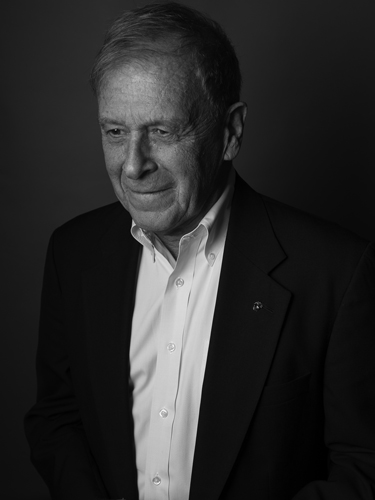
My family had an old box camera… I was just fascinated with it. And my older brother Don was interested in photography. After dinner, he’d black out the kitchen windows and set up a little developing [studio] in the sink… He’d have this white sheet of paper, the red light’s on, he puts it in this solution and shakes it around, and the image comes up. How cool is this! My mom had a decent little Kodak to take family pictures. In seventh or eighth grade, I sort of took it over.
You were on Bradley University’s legendary Speech Team. Tell us about the influence of your coach, George Armstrong.
I can't say enough good things. He’d say, “If you can get the other team off-balance so they're not thinking… you're on your way to winning. There's nothing wrong, team, with getting up there and being passionate.” We had a great time. It was about the thrill of combat, of verbal combat. Of jousting.
As it turns out, George was teaching us things that have served me beautifully all my life… how to recognize false arguments, how to present. He was the one who said to me: Ethos, Pathos, Logos… from Plato. Ethics, passion and logic. If you can weave those three things together, you’ll own the day.
Your senior year at Bradley was cut short when you received your draft notice. How did you feel?
Terrible. I mean, first of all, disbelief. It’s the height of the Vietnam War, 1969. I have to be down at the Rock Island Depot on December 3rd, 5:30am. It's a miserably cold, wet day. On the train going up through Chillicothe, I felt like a dead man on rails. We're going to AFEES—the Armed Forces Entrance Examination Station in Chicago.
When we get there the sergeant says, “Listen up, we need three volunteers for the Marine Corps—we’ll have you in San Diego, California, by midnight tonight. The other 27 will go to Fort Campbell, Kentucky, and you'll be inducted in the Army.” I'm thinking, Kentucky versus California… how bad can the Marine Corps be? So I raise my hand. And in that instant, my entire life changed.
What happened when you got to San Diego?
You get off the bus and there's a bunch of yellow footprints on the parking lot at a 45° angle—the first thing you learn is how to set your feet when you're standing at attention. So we all line up in various states of readiness… They march you into a room and you take off all your clothes—watches, rings, everything—you put all that in a box and address it home. From that point on, everything you need the Marine Corps is going to give you.
I came out of basic training with pneumonia; I'm sidelined for 30 days at Navy Hospital Camp Pendleton, California. Then I go to ITR, Infantry Training Regiment. This is where you start to throw hand grenades and other stuff you didn't do in basic training. That's when I got promoted to PFC. And from there, you can be a “ground pounder,” which is 0311, Military Occupational Specialty (MOS). You can be 0336, which was me: flamethrowers and demolitions. So I went to that school… They give you a little lecture about C-4—it looks like silly putty—and how much to use. Then you break into groups and blow stuff up (laughs). I also ran the flamethrower. It burns so intensely that it sucks the oxygen out of the air—you can't breathe. It comes out with such force, it can blow you over.
I’m thinking, I'm going [to Vietnam]… by God, I better start getting good. Then I got a meritorious promotion to lance corporal.
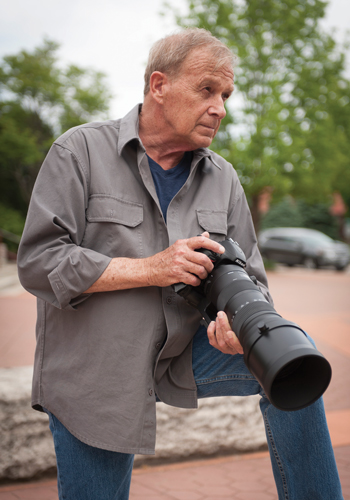 How did you become a Marine Corps photographer?
How did you become a Marine Corps photographer?
I was temporarily stationed at the Marine Corps helicopter station, Santa Ana, California. I’m out patrolling one day… and saw a little silver Quonset hut that said “Photo Lab.” I went in and said, “You know, I did some photography before I came into the Marine Corps.” The officer in charge tossed me a black-body Nikon camera—exactly what I left back in Peoria. “Grab yourself six or eight rolls of film, go out and shoot some things… I'll see what you can do.”
Three days later, I'm transferred out of MPs [Military Police] and I'm in the photo lab—virtually unheard of. I'm sitting there thinking, fate has given you a chance to show what you can do, Bruce Brown, don’t mess this up!
Then my Vietnam orders came through. The officer says, “LCpl. Brown, I can't do anything about the orders, but there are a couple things I can do. I want you to be at the ‘head shed’ tomorrow morning at eight o’clock. The base commander is going to hand you a sheet of paper that says your MOS is now 4631, photographer. He will also hand you a second sheet of paper that says your rank is no longer lance corporal; it's corporal.”
I'm in the Marine Corps for nine months and I'm a corporal, which normally takes about three years. Because I understood what they wanted. It was all due to paying attention.
But then you never ended up in Vietnam after all…?
We left LAX for Vietnam just after New Year’s [1971], 120 Marines aboard a chartered Boeing. Long flight to Okinawa—we’re going to land at Kadena Air Base to refuel. We're about two hours out and the captain said, “Attention, Marines. There are three of you aboard with the Third Marine Division, Da Nang. We just got word the Third Marine Division has pulled out of Vietnam and is going to be stationed at Okinawa. So when we land at Kadena Air Base, you three Marines get your gear and get off the plane.”
How did you feel about the war prior to being drafted?
I didn't feel one way or another about it—it was off my radar screen. When I came home on leave after learning how to blow stuff up and operate the flamethrower, I went to see my girlfriend at the U of I. It happened to be the weekend that protesters shut down the whole campus, and I'm the only one walking around with a sun tan and shaved head. This is a whole generation getting ready to hit the fan, but you don't see it until it’s happening. We had a pretty tense weekend.
Did your feelings evolve when you were overseas?
So, it’s mid-summer in Okinawa, hotter than hell. The captain says, “We need somebody to go over to the Navy Hospital to do some grip-and-grin pictures.” There's some colonel up from Vietnam, giving out awards. It's a 500-bed hospital—all the beds are full and the helicopters are bringing more in. Most of them are unconscious, and some were still bleeding. They all have these little plastic slippers by the side of the bed, and the slippers have blood on them. I'm down there taking a picture, and the colonel says, “Corporal, I'm up here.” I said, “Yes sir, I was just checking focus.”
The size and scale of the war was starting to set in on me, big time. I'm getting a little woozy… When we got done, he says, “Corporal, you don’t look so good. Let’s get you outside and get some air.” They pick me up in a Jeep—it's a quiet 20 minutes back to the lab. The captain comes out and says, “What's going on? What happened over there?”
I was really worked up. I said, “Captain, I worked for a couple newspapers before I came into the Marine Corps. The pictures I took today, there's not a paper in the country that would print any of them. They're still bleeding!”
And he says, [pointing to his chest] “Corporal, do you know what this is?” I said, “Yes sir, that’s a Bronze Star, two Purple Hearts, and some other awards I don’t recognize.” He says, “Corporal, the day I was awarded these by the division commander, I was on crutches. I’d just come out of the Navy Hospital in Da Nang; I had an eyepatch and I could barely walk. The only thing I regret is that there wasn't somebody who knew how to stand on a Nikon like you do. If I had a picture, I’d whip it out and show you.
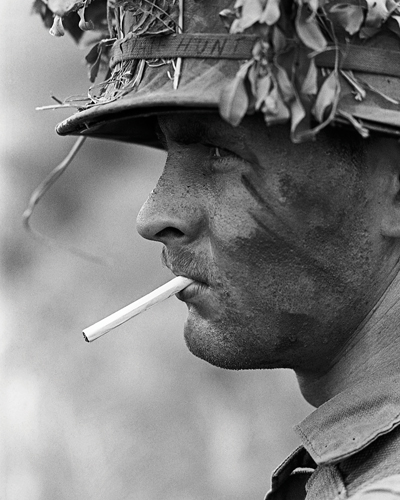
Portrait of PFC Marty Rice by Bruce Brown, Marine photographer
“Corporal, these pictures aren't for the newspapers. They’re for your fellow Marines who risk their lives for the Marine Corps and the United States of America. So when they go home and 50 years from now somebody says, ‘Grandpa, what did you do in the war?’… they can whip out the picture and show them.” That’s the day the war came home.
When did you return to the States?
I think it was the week before Thanksgiving, November of ‘71. Everybody on board was standing up and jumping except me. I'm not a very demonstrative person… but you have time to percolate. And when that plane touched down, I was literally jumping over seats with elation. I got off that airplane and kissed the ground.
And you were running for Peoria City Council about a year later. What inspired you to run?
I was always interested in city politics. When I was at Bradley, I’d go down to City Council meetings. Everywhere I went, I always had a newspaper. My mom would send me the Journal Star in Okinawa—it would arrive seven days past publication. And when you get out of the Marine Corps, you think there isn’t anything you can't do.
I ran in the Third District—an eight-way race. There were nine Council positions open citywide, all at once; every district had five to eight candidates. Turnout was in the 60-to-70-percent range. The whole community was in an uproar over “poor governance.” There was a mood—no, a great upheaval—in the air. The community wanted change, and they went and voted.
So I've been elected to the Council, spring of ’73. My mom shows up at my house the next morning and says, “Your father and I were talking. How long is this for?” I said, “Well ma, the term is four years.” She says, “You’re the youngest of my seven babies—I want you to listen right now to what your mother is saying to you.” “What, ma?”
“Look at me—this isn't about what you're going to get. This is about the difference you can make with what you've been given. Do you understand?”
Leave it to Italian mothers to resonate with their “babies.” You can go through life sitting on your ass, doing nothing, trying to “get something,” or you can take the things you've been given and make a difference with it.
Eight years on the Council, I would call the equivalent of two years in the Marine Corps. It was a fantastic opportunity to work with arguably the best mayor and the best City Council the city ever had… people who wanted to do a good job for the city.
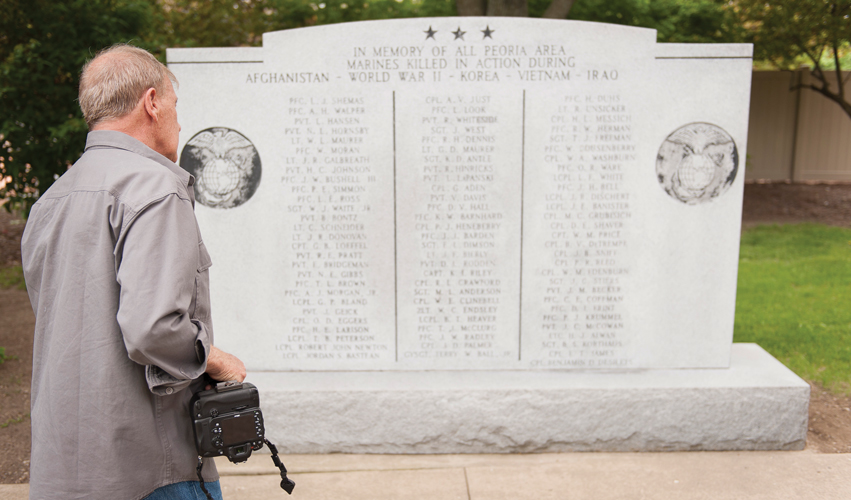
So after eight years, why did you decide to run for mayor?
I decided that for me to stay on the Council, I needed to do something else. And if I wasn't doing something else, it was time to go. So I ran against [Mayor Dick] Carver.
Carver and I agreed on about 80 percent of things. Where we disagreed... he felt that a lot of things needed to be done first, kind of in the background, and then let out. I felt that the fundamental tenets of democracy… and I even quoted to him, after the election, the thing about the Greek city-states. They had this vision of a “city on a hill,” so the eyes of the citizens were on their government all the time. I felt that there were some issues of openness, and it was time for more “open.”
Let's talk about your support for nonprofits through the fundraising dinners at Paparazzi
After we’d been open about a year, Lisa and I felt that we should do something for the community. So we had a fundraiser for Marine Corps’ Toys for Tots, and we did that 10 years in a row. Then we adopted the Peoria Ballet for 10 years. The last two years, [former Peoria Mayor] Jimmy Maloof was on the board. He’s selling tickets and getting on the phone as only Jimmy can do. He’d call and say, “Put so-and-so down for a table.” And one day Lisa says, “Bruce you gotta go talk to him—he's sold 75 seats!” I was like, “Jimmy, we’ve only got 64 seats.” And he gets this look on his face. He says, “You know, this is on a Sunday afternoon… You can have a seating at 3:00 and then do another seating at 7:00.”
We'd never done it before. This is a six-course [meal]—what we call a “three-forker,” four glasses at each table setting. So you gotta roll all this over, wash everything and reset, and you’ve got about 45 minutes after the first seating is cleared. It was a real challenge. But that was the force of character of Jimmy Maloof. I said, “Okay.” (laughs)
We've done Easterseals. We did one for the [Central Illinois] Landmarks Foundation to commemorate the start of the Civil War, and we did one for the [Peoria] Historical Society for the end of the Civil War. And they were huge. By the way, we have another one coming up this November to benefit The Shaft memorial restoration project.
What do you want your legacy to be? What is your message?
He's a United States Marine and he is a Peoria guy. Those two things, in that order.
It's the spring of 1966—I’m graduating from high school in a few days. That Sunday, I’m at the First Baptist Church on Lake Street… I wasn't paying much attention to the sermon. But somehow, the Rev. Alfred Jeffries, his voice and tone changed—and for a few supreme moments, it seemed he and I were the only ones in that great church sanctuary. “You know, folks, very often we let events in our community, our family and our very lives unfold based on what has been, rather than what could be,” he intoned. “Always reach out for what could be, rather than what has been.”
Boom! I got it! Right message. Right time. Right venue. When you get a message like that... when it is such a powerful and correct, ethical, passionate and logical message, answer “Yes!” Just keep reaching for “what could be,” always. Great communities are not made by default. They are not made by doing nothing or going through the motions. Do what you see. Do what you feel—without regard to personal cost. Just say, “Yes!” and mean it. Everything else is insignificant. iBi

